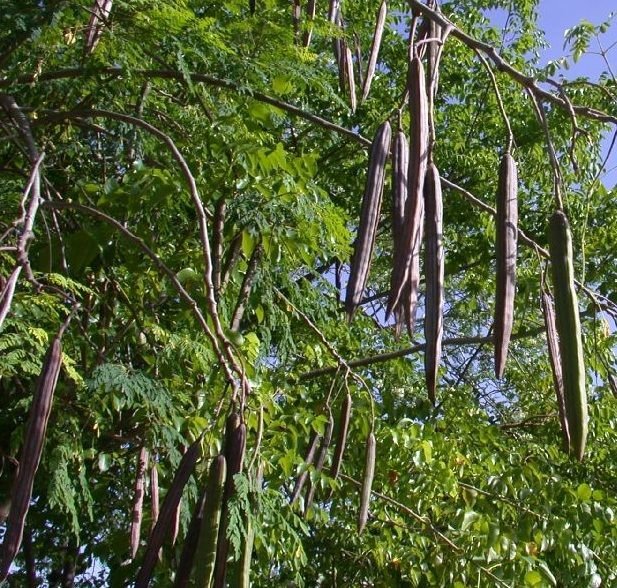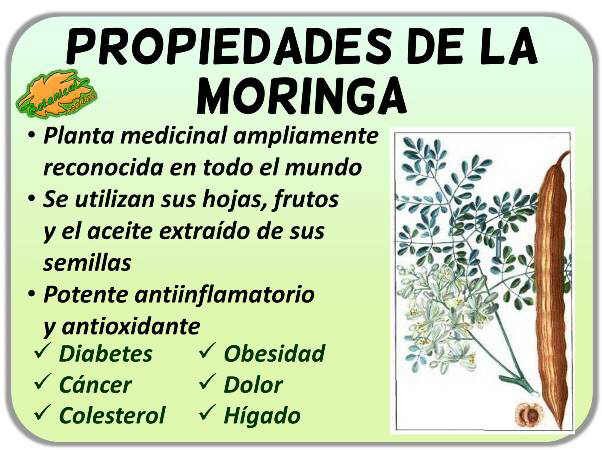The Multiple Benefits of the Powerful Moringa Tree
Moringa, sometimes described as the "miraculous tree", "ramrod tree" or "horseradish tree" has small, rounded leaves, which are filled with an incredible amount of nutrients: protein, calcium, beta carotene, vitamin C, potassium ... what you ask for, moringa has it. It has rightly been used medicinally (and as a food source) for at least 4,000 years.2
The fact that moringa grows quickly and easily, makes it particularly attractive in impoverished areas, and has been used successfully to improve nutrient intake in Malawi, Senegal and India. In these areas, moringa could be the most nutritious food available locally and can be harvested throughout the year.3
Personally, I grew a moringa tree for two years and I can guarantee that it grows as a weed. For those people who live in third world countries, it can certainly be a valuable source of nutrients.
However, I do not recommend that you plant one for health reasons in your yard, since the leaves are very small and harvesting the leaves of the stem for consumption is an extremely tedious and time-consuming task.
The leaves are tiny and difficult to harvest and use, so it probably seems to me, like me, that growing one is a lot of trouble and not worth it. That said, I can not deny that moringa offers an incredible nutritional profile that makes it very attractive, once it has been harvested . Reasons why Moringa is considered a Super Food Moringa leaves are loaded with vitamins, minerals, essential amino acids and more. One hundred grams of dried 9 times the yogurt protein
10 times the vitamin A of carrots
15 times the potassium of bananas
17 times the calcium of milk
12 times the vitamin C of the oranges
25 times the iron of spinach
moringa leaf contain
Moringa leaves are rich in antioxidants, among which we find vitamin C, beta-carotene, quercetin and chlorogenic acid. The latter, chlorogenic acid, has been shown to decrease the absorption of sugar in cells and studies with animals have found that it reduces blood sugar levels. According to the Asian Pacific Journal of Cancer Prevention: 5
"There have been reports that the leaves of the Moringa oleifera tree have demonstrated antioxidant activity due to their high polyphenol content.
The extract of mature and tender leaves of Moringa oleifera exhibits a strong antioxidant activity against free radicals, prevents oxidative damage to larger biomolecules and provides significant protection against oxidative damage. "
In addition, in a study in which some women consumed 1.5 teaspoons of moringa leaf powder over a period of three months, they significantly increased their levels of antioxidants in the blood
Lower Blood Sugar Level:
Moringa seems to have antidiabetic effects7, probably thanks to beneficial plant compounds found in leaves, such as isothiocyanates. One study found that women who took seven grams of moringa leaf powder daily for three months reduced their fasting blood sugar by 13.5 percent.8
Some separate research revealed that adding 50 grams of moringa leaves to a meal reduced the blood sugar increase by 21 percent among patients with diabetes
Reduce inflammation:
Isothiocyanates, flavonoids and phenolic acids in leaves, pods and moringa seeds also have anti-inflammatory properties. According to the Epoch Times: 10
"The strong anti-inflammatory action of the tree was traditionally used to treat stomach ulcers Moringa oil (sometimes called Ben) has been shown to protect the liver from chronic inflammation.The oil is unique in that, unlike most oils vegetables, moringa resists rancidity.
Its quality makes it a good preservative for foods that can decompose quickly. This sweet oil is used to fry food or as a dressing for salads. It is also used topically to treat antifungal problems, arthritis, and is an excellent moisturizer for the skin. "
Maintain a Healthy Cholesterol Level:
Moringa also has cholesterol-lowering properties, and an animal study found that its effects could be compared to those of the drug simvastatin, to lower cholesterol.11 According to the Journal of Ethnopharmacology: 12
"Moringa oleifera is used in traditional Thai medicine as a cardiotonic, and recent studies have demonstrated its hypocholesterolemic effect.
... In rabbits fed with excess cholesterol, a 12-week treatment significantly reduced (P <0.05) cholesterol levels and decreased atherosclerotic plaque formation by 50 to 86%, respectively. The degree of these effects is comparable to those of simvastatin.
... The results indicate that this plant possesses antioxidant, hypolipidemic and anti-atherosclerotic activities, and has therapeutic potential for the prevention of cardiovascular diseases
How to use Moringa:
If you have access to a moringa tree, you can use the fresh leaves in your food; Its flavor is similar to radish. Consume them as a salad, mixed in their smoothies or boiled like spinach. Another option is to use moringa powder, either as a supplement or in smoothies, soups and other foods to get more nutrients. Moringa powder has a distinctive "green" flavor, so perhaps you should start adding it to your meals little by little.
You can also use moringa oil (or ben oil) organic and cold pressed, although it is expensive (about 15 times more than olive oil) .18 As I mentioned earlier, although I do not necessarily recommend planting a moringa tree in your backyard (a fast-growing tree can measure 15 to 30 feet in a few years), it would be good to try the leaves or dust if you find it in your local health food market.
Studies show that moringa leaves have antitumor and anticancer activities, due in part to a compound called niaziminin. Preliminary experiments also show activity against the Epsetein-Barr virus. The compounds in the leaf appear to help regulate the function of the thyroid, especially in cases of hyperthyroidism. The deeper investigations show antiviral activity, in the case of herpes simplex

